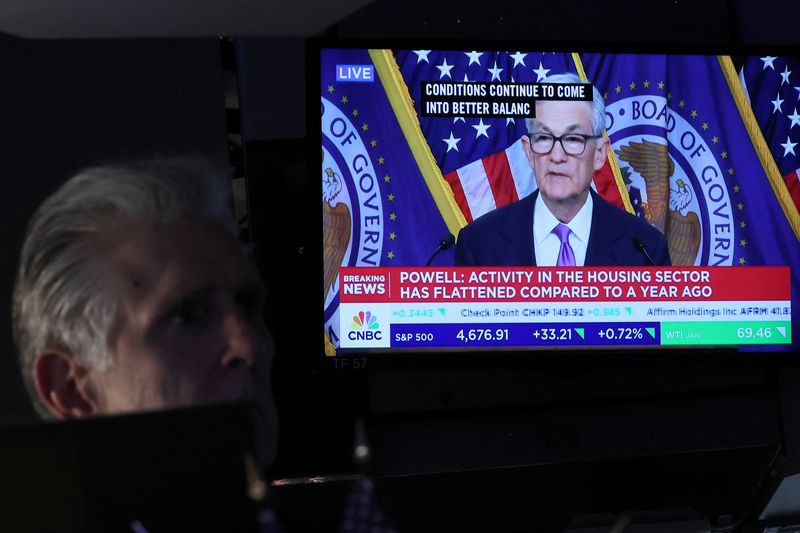By Stephen Culp
NEW YORK (Reuters) - Wall Street extended its rally on Tuesday, advancing on the day as last week's dovish policy pivot from the Federal Reserve continued to reverberate and investors looked ahead to crucial inflation data.
Broad-based gains boosted all three major U.S. stock indexes and nudged the S&P 500 to within 1 percentage point of its all-time closing high reached in January 2022. If the benchmark index closes above that level, that would confirm it has been in a bull market since bottoming in October 2022.
The blue-chip Dow nabbed another all-time closing high.
Small-caps have had a strong run in December; the Russell 2000 led gainers, rising 1.9%. The index has surged over 11.7% in December so far.
"It’s Fed fumes," said Ross Mayfield, investment strategy analyst at Baird in Louisville, Kentucky. "And there's no real catalyst at this point in the calendar year to provide any kind of downside pressure."
"Obviously, the levels investors hold dear like bull and bear markets are important psychologically," Mayfield said. "But what’s more important is the breadth is expanding, the momentum is there, and the economy is confirming this move."
FedEx (NYSE:FDX) tumbled 8% in extended trade after the package delivery company cut its full-year revenue forecast as it battles United Parcel Service (NYSE:UPS) in what is shaping up to be a weak holiday season. UPS dropped 2.6%.
At the conclusion of the central bank's policy meeting last Wednesday, the Federal Open Market Committee signaled that it had reached the end of its tightening cycle and opened the door to rate cuts in the coming year.
Atlanta Fed President Raphael Bostic said on Tuesday there was "no urgency" to begin cutting rates, given the strength of the economy and the slow rate at which inflation is cooling down toward the central bank's 2% annual target.
Even so, financial markets are pricing in a 67.5% likelihood that the Fed will implement a 25 basis-point rate cut as soon as March, according to CME's FedWatch tool.
"The market is probably running ahead of the Fed a little bit and the Fed is right to throw some water on that," Mayfield added. "But the markets aren’t really buying it and the Fed is not doing much to change the narrative."
On the economic front, a report from the Commerce Department showed groundbreaking on new single-family homes surged 18% to more than a 1-1/2 year high in November.
The S&P 1500 Homebuilding index and the Philadelphia SE Housing index advanced 1.6% and 1.2%, respectively.
The Commerce Department is expected to release its final take on third-quarter GDP on Thursday, to be followed by its broad-ranging Personal Consumption Expenditures (PCE) report on Friday, which will cover income growth, consumer spending, and crucially, inflation.
The Dow Jones Industrial Average rose 251.9 points, or 0.68%, to 37,557.92, the S&P 500 gained 27.81 points, or 0.59%, to 4,768.37 and the Nasdaq Composite added 98.03 points, or 0.66%, to 15,003.22.
All 11 major sectors of the S&P 500 ended the session in positive territory, with energy and communication services enjoying the largest percentage gains.
Boeing (NYSE:BA) rose 1.2% after German airline Lufthansa revealed it ordered 40 737-8 MAX jets from the planemaker.
Kenvue (NYSE:KVUE) climbed 2.2% following a U.S. court ruling in favor of the consumer health company in a lawsuit over the company's drug Tylenol.
Amgen (NASDAQ:AMGN) advanced 1.1% after BMO upgraded the company's shares to "outperform" from "market perform."
Advancing issues outnumbered declining ones on the NYSE by a 4.68-to-1 ratio; on Nasdaq, a 2.85-to-1 ratio favored advancers.

The S&P 500 posted 48 new 52-week highs and 1 new lows; the Nasdaq Composite recorded 200 new highs and 82 new lows.
Volume on U.S. exchanges was 11.61 billion shares, compared with the 11.97 billion average for the full session over the last 20 trading days.